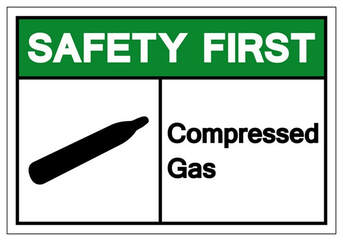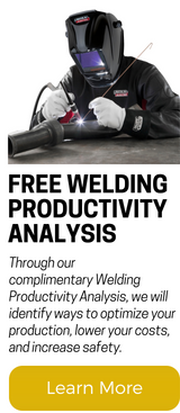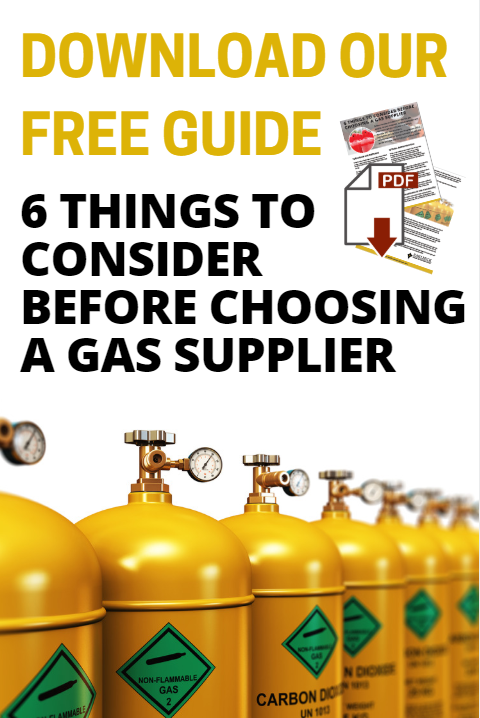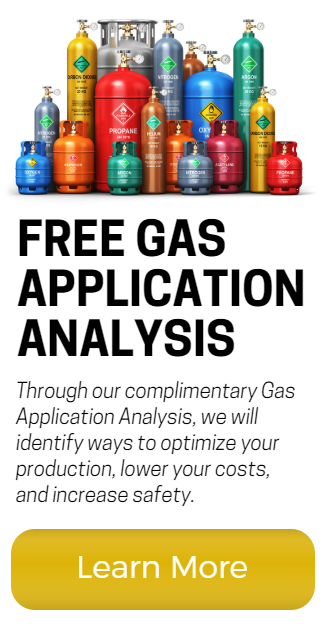 Here are important tips on keeping employees, as well as equipment, safe in the workplace. Think safety, leave safely! Potential Compressed Gas Cylinder Hazards Compressed gas cylinders can be dangerous, and you need to be aware of the potential hazards and how to stay safe when handling, transporting, and using them. The contents within the cylinder can be toxic, flammable, oxidizing, corrosive, or inert; and can cause physical harm, if not handled and stored properly. According to the Occupational Safety and Health Administration (OSHA), A compressed gas is a gas or mixture within a container. Pressure requirements have an absolute pressure of 40 psi at 70 degrees Fahrenheit or an absolute pressure of exceeding 104 psi at 130 degrees Fahrenheit, or a liquid having a vapor pressure exceeding 40 psi at 100 degrees Fahrenheit. Here are some things to keep in mind when handling cylinders: The cylinder can become something very similar to a missile. The valve controls the flow of gas; and if broken, you have lost the ability to manage a safe working environment. If this is not corrected, the potential mishap could be detrimental to employees and your business. Have you seen that MythBusters episode? (…It’s fact) Click here to check out their experiment. Compressed gas cylinders can cause explosions, fires, or even deplete a working area of oxygen, if you have a faulty valve or not handling the vessel properly. Always contact your supplier whenever you have concerns about your gas cylinder! Don’t worry, you do have control over this situation at your facility! Always store cylinders upright with a chain or strap to prevent them from falling. Never store cylinders in a cabinet or closed-in area with little ventilation, this promotes a dangerous gas build up if a leak occurs. If you store cylinders outside, you want to protect them from any extreme heat elements. When storing your cylinders inside, keep Oxygen and Nitrous Oxide at least 20 feet away from flammable gases. If you are tight on space, a high-pressure storage cabinet, with firewall, may be a good option for your company. These types of storage cabinets are engineered to be OSHA and NFPA compliant; and allow you to store oxygen and flammable gases together. Also, use the proper signage over the area where the cylinders are being stored, i.e. Flammable over the acetylene cylinders. Finally, all cylinders that are empty should be tagged and kept separate from ones that are full. Keep the valves closed when not in use, this is especially important because some gases are inert, such as Helium and Argon (to a welding perspective). If your valve is left open, it will deplete the oxygen within your facility. It can also cause respiratory, eye, and even skin problems without the proper safety gear or plan in place. If you have a leaking valve, you will need to transport the cylinder to a well-ventilated area and call your gas supplier immediately! As your gas supplier (or prospective), we have included CGA Cylinder Safety Poster for download on our Resources page, check it out! Most accidents occur while a cylinder is being transported or moved. Proper safety, when transporting cylinders, includes employees being fitted with safety glasses, gloves, and protective footwear. Safety wear should always be a requirement; and be worn whenever handling a cylinder. Use of a cylinder cart, with a chain or strap, instead of rolling or dragging a cylinder to the desired location, is the safest way to relocate a cylinder. Also, make sure that the person handling the cylinder is physically capable and knowledgeable in cylinder handling. Always remember to close the valve and put the safety cap on when moving the cylinder, even if it is just a small distance away! These tips can help minimize the risks of physical injury, that can be caused by dropping or mishandling a cylinder. When you need to transport a cylinder by vehicle, you will always want to keep the cylinders upright and strapped in securely during transport. Never ever lay a cylinder on its side, as it can lead to catastrophic damages to your vehicle and major injuries to the driver. Safety during the use of the cylinders. Always open the valve by hand if the cylinder is fitted with a hand wheel. If you are unable to open the valve, using a hand wheel, notify your gas supplier to request a replacement. If a tool is needed, leave it in position so the valve can be cut quickly in case of emergency. When releasing the valve, do so slowly. While in use, always keep the cylinder upright and away from sparks, high heat, fire and electrical circuit, as this will help prevent a disaster. Employees must also keep oil and grease away from oxygen cylinders, if the two mix it has the potential of violent reaction. Even though compressed gas cylinders look sturdy, they are very dangerous! Good safety practices are vital to keeping you and your employees safe. Safety is our goal, why not take advantage of our Free Gas Application Analysis? You can click the "Learn More" button to the right of your screen and one of our gas experts will be there to assist! Here's a step-by-step tutorial on how to load your compressed gas cylinder onto a hand cart. Special thanks to Matt Myers in Shipping and Receiving for the demonstration! |
- Products & Services
- Gases
-
Welder Training
-
Program Overview
>
- Pricing and Class Schedule
- How to Register
- Tour Our Facility
- Why Earlbeck Technical Center
- On Site Training
-
Frequently Asked Questions
>
- Are student loans, financial aid, or scholarships available?
- How long does it take to complete the program?
- What should I bring for my first day of class?
- Where can I find information about weather related closures or delays?
- Do you offer job placement?
- How Much Money does a Welder Make?
- What is the Job Outlook for Welders?
-
Program Overview
>
-
Weld Testing
- Welding 101 Blog
- Locations & Contacts
- More...
Baltimore, MD8204 Pulaski Hwy
Baltimore, MD 21237 Welding Supply & Gas Showroom Hours: Mon- Fri 7:30 AM - 5PM Phone: (410) 687-8400 Fax: (410) 687-1394 Welder Training & Testing Center Phone: (410) 687-8400 |
Beltsville, MD10792 Tucker St
Beltsville, MD 20705 Welding Supply & Gas Showroom Hours: Mon-Fri 7:30AM - 4:30PM Phone: (301) 937-8884 Fax: (301) 937-1811 6170 Hughesville Station Place
Hughesville, MD 20637 Welder Training & Testing Center Phone: (410) 687-8400 |
York, PA95 Aberdeen Rd
York, PA 17406 Welding Supply & Gas Showroom Hours: Mon-Fri 7:30AM - 4:30PM Phone: (717) 916-6611 Fax: (717) 764-1281 Welder Training & Testing Center Phone: (410) 687-8400 AACC Clauson Center for Innovation and Skilled Trades101 College Parkway
Arnold, MD 21012 Welder Training & Testing Center Phone: (410) 687-8400 |
Scranton, PA4961 Birney Ave
Scranton, PA 18507 Welding Supply & Gas Showroom Hours: Mon-Fri 7:30AM - 5:00PM Phone: (570) 457-8954 3427 N Main Ave
Scranton, PA 18508 Welder Training & Testing Center Phone: (410) 687-8400 |




 RSS Feed
RSS Feed